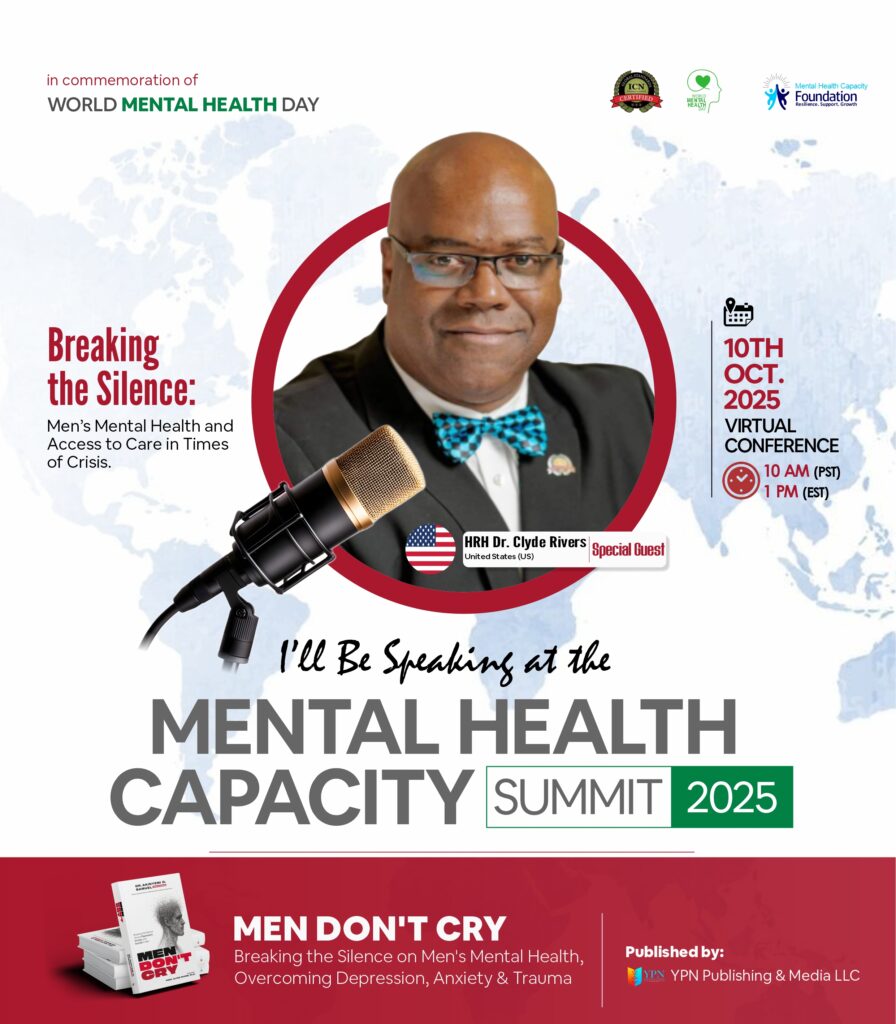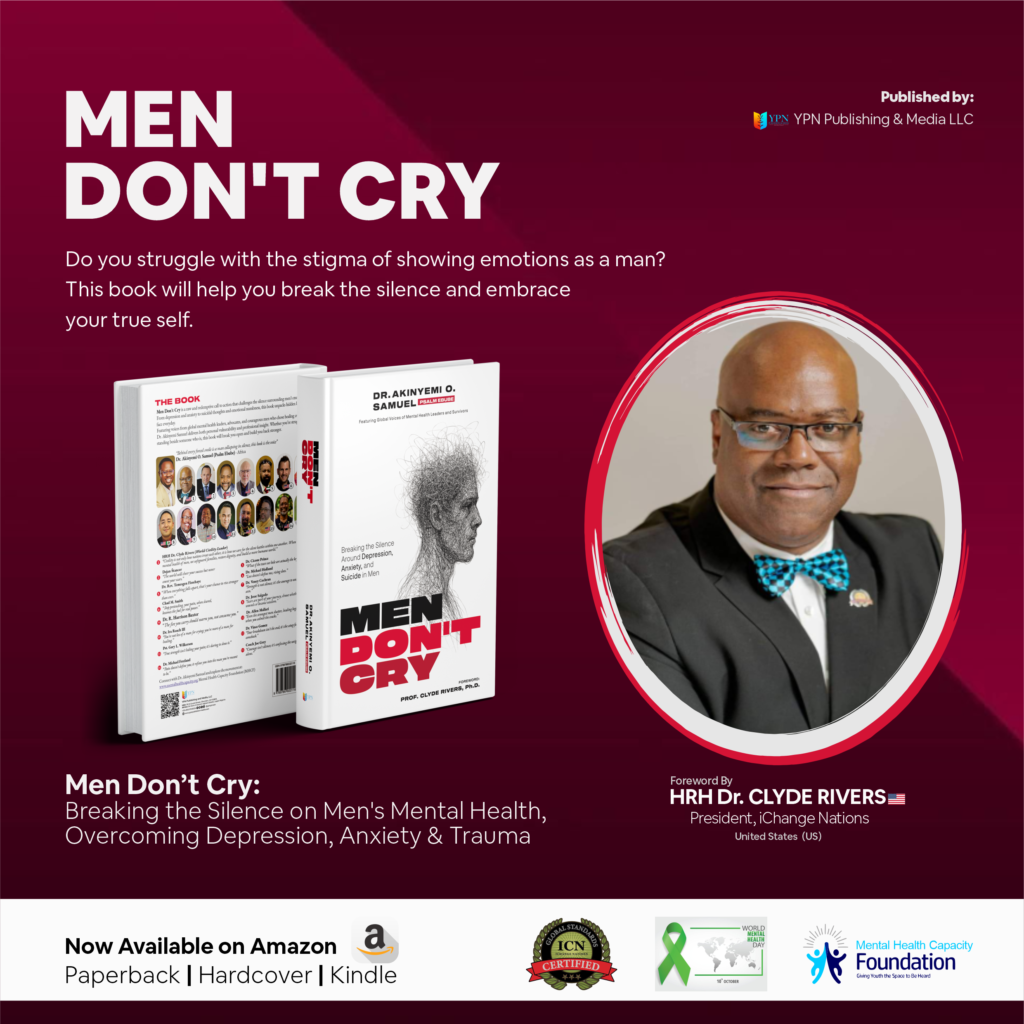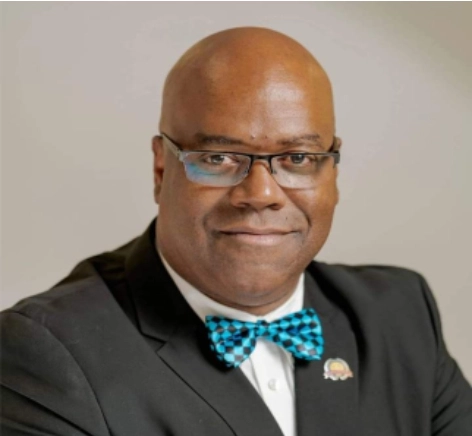Sheridan, USA October 04, 2025 Innovation Times Senior Correspondent
Civility, HRM Dr. Clyde Rivers often reminds the world, is not only how nations treat each other, it is how humanity cares for the silent battles within one another. In his foreword to the book Men Don’t Cry, Dr. Rivers calls attention to one of the most neglected crises of our time: the unspoken struggles of men’s mental health. His words form not just an introduction, but a global appeal for compassion, awareness, and change.
Across continents, cultures, and classes, men face a shared burden. From presidential palaces to village huts, Dr. Rivers has observed a painful reality: men are suffering in silence. Fathers, sons, brothers, and husbands conceal immense emotional pain behind the mask of strength. While the world celebrates their resilience, it largely ignores their vulnerability. In this silence, countless men are breaking some beyond repair.
As World Civility Leader and a lifelong advocate for human dignity, Dr. Rivers underscores a sobering truth in his foreword: ignoring the cries of men comes at a generational cost. When men’s struggles go unaddressed, families fracture, communities weaken, and future generations inherit the wounds of silence.
The book Men Don’t Cry, with Dr. Rivers’ opening reflection, arrives as more than a publication. It is a mirror, exposing hidden realities. It is a movement, urging societies to recognize that vulnerability is not weakness but humanity. It is also a mandate, compelling communities, leaders, and families to adopt a higher standard of care for men’s mental well-being.
Dr. Rivers describes the work as a lifeline for those who have long felt pressured to bury their emotions. Every page challenges cultural norms that shame men for expressing grief, sadness, or fear. Instead, it offers men permission to reclaim their voices and embrace their humanity.

The timing could not be more significant. On October 10, World Mental Health Day will be observed under the theme Breaking the Silence: Men’s Mental Health and Access to Care in Times of Crisis. The author of Men Don’t Cry will join leading voices in mental health advocacy on that day to highlight the urgent need for support systems that prioritize men’s mental well-being. The message of this book will play a central role in shaping the conversation.
Civility is not passive; it is active compassion. It is choosing to see the person behind the behavior, the story behind the silence. It requires humility, patience, and a willingness to learn from others. In its purest form, civility restores human connection in a world that often rewards competition over care.
Civility also plays a vital role in education and faith. It teaches that wisdom is not found in dominance but in understanding. It reminds us that spiritual and emotional growth are inseparable from the way we treat one another. When faith and civility align, communities thrive in harmony and purpose.
Practicing civility also means holding oneself accountable. It is not only about how we treat others, but how we manage our own emotions and reactions. It challenges each person to rise above impulse and respond with integrity. Civility asks us to choose peace even when anger seems easier.
In the age of social media and constant public discourse, civility is under threat. The ease of digital communication has made it simple to attack, criticize, or demean others without consequence. Dr. Rivers calls for a new digital civility, where online spaces become platforms for empathy, education, and constructive dialogue instead of hostility.
Civility must also extend to workplaces, where respect for mental health and emotional safety becomes a measure of organizational excellence. A civil work culture values people over profit and understands that a healthy mind produces the best results.
When applied to mental health advocacy, civility transforms how societies view care. It replaces stigma with understanding and silence with conversation. It makes it possible to reach those who have been hiding behind the mask of strength for far too long.
Dr. Rivers believes that civility is the missing link between emotional wellness and societal progress. Without it, programs, laws, and campaigns lose their human touch. With it, the world moves closer to harmony, where no one is left behind in silence or pain.
Civility requires courage. It means choosing kindness when indifference feels easier. It demands that we see humanity before status, and shared pain before personal pride. It is not just about being polite; it is about building a world where every person feels seen, heard, and valued.
In every sense, civility is healing. It restores relationships, rebuilds trust, and repairs broken communities. It gives hope to those who have been overlooked and dignity to those who have been dismissed. It is the soul of leadership and the heartbeat of peace.
If the world is to move forward, civility must become more than a word; it must become a way of life. It begins with small acts of understanding, genuine listening, and the willingness to see the humanity in one another.
As Dr. Clyde Rivers often says, “Civility is not just a principle; it is a pathway to peace.” It is time for every nation, every leader, and every individual to walk that path together.
The silence surrounding men’s mental health has long been one of society’s most damaging cultural patterns. Men are praised as leaders, providers, and protectors, yet discouraged from admitting vulnerability. Too often, they are denied the freedom to say, “I am not okay.” This book seeks to disrupt that silence with courage and compassion.
Each chapter of Men Don’t Cry illuminates unspoken truths while offering hope and practical guidance. Readers are invited to confront the uncomfortable realities that men endure and to envision healthier ways forward. The book demonstrates how openness can heal, dialogue can prevent tragedy, and compassion can restore dignity to individuals and families.
Dr. Rivers emphasizes that men’s mental health is never an isolated issue. A father’s suppressed pain affects his children. A son’s silent suffering shapes his adulthood. A husband’s hidden struggles reverberate through his household. Neglecting men’s well-being destabilizes families and weakens communities.
This is why Dr. Rivers recommends Men Don’t Cry not only to men, but also to women, leaders, policymakers, educators, and caregivers. The book serves as a guide for those seeking to understand and support the men in their lives. It equips society with tools to end the cycle of silence and loss.
The upcoming mental health summit will emphasize that men’s mental health is central to public health and community stability. By addressing it, nations can strengthen families, reduce crises, and build more humane societies.
Dr. Rivers’ foreword is striking in its balance between urgency and hope. While it highlights the depth of the crisis, it also reveals pathways to healing. It reminds readers that breaking silence is possible, that care can be offered, and that dignity can be restored to men who have carried too much for too long.
The message is clear: Men Don’t Cry is not just for men. It is for families who need understanding, for societies that seek stability, and for leaders who must reimagine the meaning of care. The book is both a challenge and an invitation; a call to rewrite the global narrative on men’s mental health.
Dr. Rivers envisions a world where men can express emotion without stigma, where families thrive because men no longer suffer in isolation, and where communities flourish because hidden battles are acknowledged and addressed. That world, he argues, begins with awareness and with resources like this book.
The responsibility lies with everyone. By reading and sharing Men Don’t Cry, communities can spark conversations that change lives. The book belongs in homes, schools, workplaces, faith institutions, and policy circles. Its message is too vital to remain confined to the private shelf.
As World Mental Health Day approaches, the book offers a timely reminder: silence is no longer an option. The time has come to recognize men’s mental health as a matter of global importance. Families, societies, and nations stand to gain when men are given space to heal and thrive.
Dr. Rivers’ foreword gives readers a vision of what is at stake. History, he suggests, will not measure nations solely by their achievements in industry or technology, but also by how they responded to the silent cries of their people. Protecting men’s mental health is not charity; it is the foundation of a humane and sustainable future.

Men Don’t Cry is available worldwide in multiple formats, ensuring accessibility for diverse readers:
Dr. Rivers’ message resonates with urgency and clarity. To ignore men’s mental health is to jeopardize families, communities, and future generations. To address it is to safeguard dignity, restore humanity, and strengthen the bonds that hold societies together.
This World Mental Health Day, the call is simple but profound: break the silence, extend care, and read Men Don’t Cry.
HRM Dr. Clyde Rivers, a globally respected advocate for civility and founder of I Change Nations, continues to reshape how the world views humanity, leadership, and emotional wellness. Known internationally as the “Ambassador of Civility,” Dr. Rivers has spent decades promoting a message that transcends politics, culture, and borders: that every human being carries intrinsic value and deserves to be treated with respect. In his most recent reflections on men’s mental health, he brings a profound and compassionate voice to an often-overlooked issue, linking civility to the emotional struggles many men silently endure.
Dr. Rivers believes that civility is more than a moral principle; it is a pathway to healing. He defines it as the active recognition of human worth and the practice of honoring that worth through empathy, understanding, and respect. His teachings highlight that societies cannot truly thrive when men are forced to suppress their pain, hide their struggles, or conform to outdated ideals of strength that deny their emotional reality.
For Dr. Rivers, civility begins with listening. He asserts that true compassion is impossible without the willingness to hear another person’s story without judgment. In the context of men’s mental health, this means creating spaces where men can express vulnerability without fear of ridicule or shame. Through his work, he has continually emphasized that when we practice civility, we create an environment where men can finally speak, heal, and rediscover purpose.
Over the years, Dr. Rivers has observed that many men are conditioned to equate silence with strength. This cultural expectation, he explains, has caused deep emotional wounds. Civility challenges this narrative by redefining strength not as the absence of emotion, but as the courage to acknowledge it. By promoting this redefinition, Dr. Rivers is helping dismantle the stigma surrounding men’s mental health and encouraging open dialogue across generations.
His approach combines moral philosophy with human compassion. Drawing from his global experience as a leader, diplomat, and educator, Dr. Rivers teaches that civility has the power to heal not only nations but individuals. He argues that emotional wellness is a human right and that societies must cultivate respect for men’s emotional needs in the same way they address physical and economic issues.
Dr. Rivers’ advocacy for men’s mental health is rooted in his belief that every man has a divine purpose that cannot flourish in silence. He calls upon leaders, families, and institutions to adopt a culture of civility that values openness and empathy. By recognizing that men, too, face depression, anxiety, and inner battles, he urges the world to treat mental health as an issue of human dignity.
In his international speaking engagements, Dr. Rivers has often highlighted how civility is not passive politeness but active compassion. He describes it as the power to restore hope in the broken and value in the overlooked. This message resonates deeply in the ongoing conversation about mental health, where men often feel unseen or misunderstood.
Through his work, Dr. Rivers bridges the gap between global leadership and personal well-being. He teaches that leaders who practice civility inspire strength in others because they lead with empathy. This form of leadership, he explains, is not about dominance but about service. It is about recognizing that power must always be used to uplift, not to silence.
His philosophy on civility aligns closely with the global movement to destigmatize mental health. He often reminds audiences that emotional health is a cornerstone of societal peace. A world that neglects the emotional struggles of its men, he argues, cannot achieve true harmony. Civility provides the language and framework needed to restore that balance.
Dr. Rivers’ work also emphasizes that civility begins at home. He calls for families to create safe emotional spaces where fathers, sons, and brothers can express their fears and pain without judgment. He believes that transformation begins in personal relationships and extends outward to communities and nations.
As part of his ongoing advocacy, Dr. Rivers supports initiatives that address men’s well-being from a holistic perspective, integrating emotional, spiritual, and social dimensions. He insists that the way societies treat their men reflects the health of their collective conscience. A culture that listens, respects, and uplifts is a culture rooted in civility.
Dr. Rivers’ message has reached audiences across continents, from royal courts to grassroots movements. In each setting, he emphasizes that civility is not an abstract idea but a daily practice. It is about how we speak, how we listen, and how we respond to human need.
When addressing the theme of Breaking the Silence: Men’s Mental Health and Access to Care in Times of Crisis, Dr. Rivers underscores that silence kills more men than disease. He calls on nations to replace shame with support and isolation with community. Through civility, he believes that men can reclaim their voices and restore their sense of purpose.
His teachings remind the world that mental health advocacy must be rooted in respect and compassion. Civility transforms how institutions treat individuals and how individuals treat each other. It calls for the acknowledgment of pain and the commitment to healing through kindness.
Dr. Rivers’ perspective has also influenced international policymakers, faith leaders, and educators. By framing civility as a tool for peace and emotional recovery, he offers a framework that unites moral ethics with mental well-being. His message is clear: we cannot achieve world peace without first achieving inner peace, and civility is the foundation for both.
He continues to mentor emerging leaders, encouraging them to practice what he calls “transformational civility.” This means leading with understanding, governing with empathy, and building communities that honor human dignity. His work demonstrates that civility is not only a virtue but a strategy for societal transformation.
Dr. Rivers’ influence extends beyond his words. Through I Change Nations, he has recognized countless individuals and organizations working to promote civility and human value. Each recognition, he explains, is a reminder that the world changes not through force, but through the quiet power of respect.
As the world observes Mental Health Day, Dr. Rivers’ call for civility becomes especially significant. His message challenges societies to view men not as symbols of unshakable strength, but as human beings deserving of care, compassion, and understanding.
Ultimately, HRM Dr. Clyde Rivers’ philosophy of civility offers more than social reform; it offers a vision of a healed humanity. In his view, a civil world is one where men no longer suffer in silence, where empathy is strength, and where every voice, regardless of gender, is heard with dignity.



